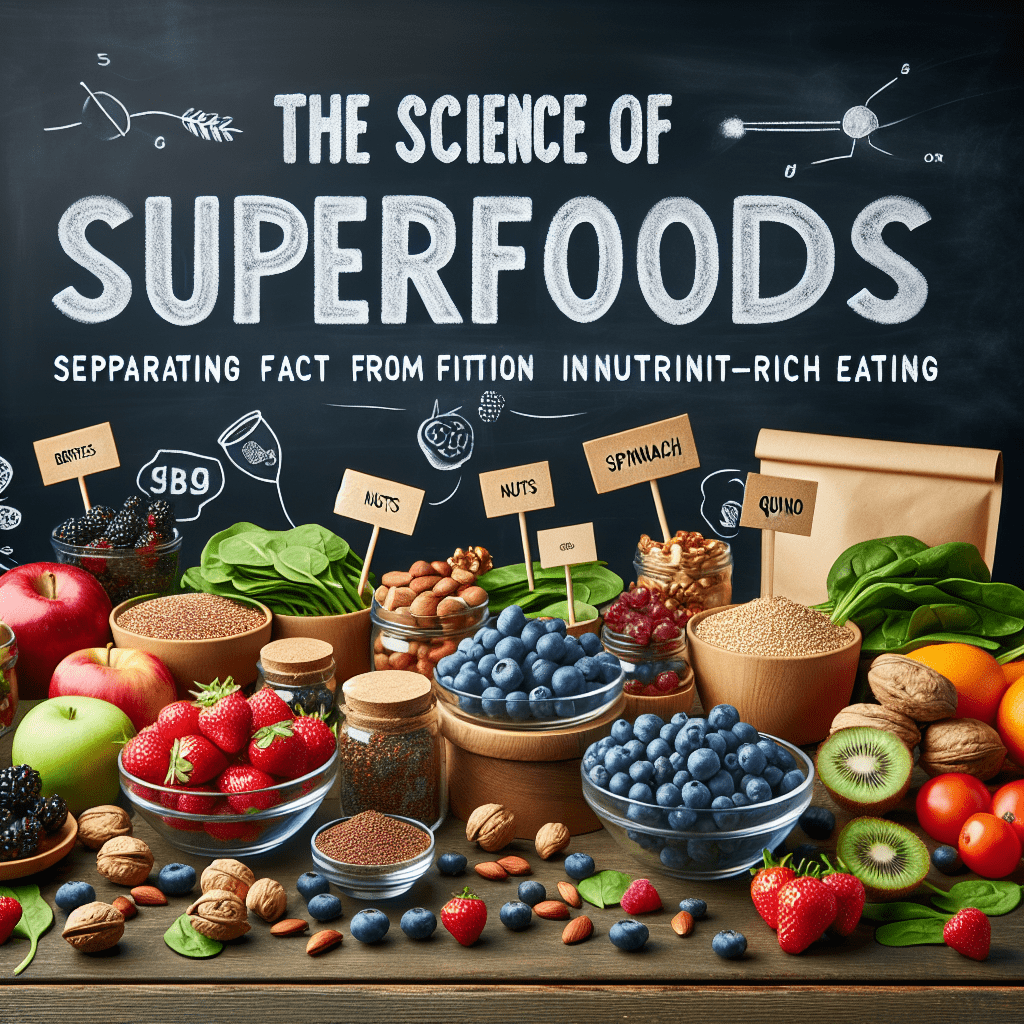[ad_1]
### The Science of Superfoods: Separating Fact from Fiction in Nutrient-Rich Eating
In the realm of health and nutrition, the term “superfood” has become as ubiquitous as it is mystifying. From acai berries to kale and quinoa, the list of so-called miracle foods has grown exponentially over the years, each accompanied by lofty claims of unmatched health benefits. But what separates fact from fiction in the world of superfoods? And how can we navigate the haze of marketing to make truly healthful choices in our diets? Let’s dive into the science behind nutrient-rich eating and demystify the concept of superfoods.
#### Understanding Superfoods
The term “superfood” is not scientifically defined, leading to its widespread and sometimes misleading use. In the most general sense, it refers to foods that are exceptionally rich in nutrients and beneficial compounds such as antioxidants, vitamins, and minerals. The idea is that these foods offer superior health benefits, protecting against diseases and contributing to a longer, healthier life. However, it’s important to note that the label “superfood” is more of a marketing tool than a classification based on rigorous scientific criteria.
#### The Science Behind Nutrient Density
Nutrient density is a factual, measurable concept that describes the level of nutrients per calorie in a food item. Foods considered to be superfoods often have a high nutrient density, providing a significant amount of vitamins, minerals, and other beneficial substances with relatively few calories. This is where the real value of incorporating such foods into your diet lies – in the potential to consume a concentrated source of valuable nutrients.
For example, leafy green vegetables like kale and spinach are lauded for their high levels of vitamins A, C, and K, as well as minerals like calcium and iron, all with minimal calories. Berries, often labeled as superfoods, are packed with antioxidants, which play a role in reducing inflammation and protecting the body’s cells from damage.
#### Separating Fact from Fiction
While the nutrient density of these foods is undeniable, the superfood label can sometimes lead to overstated claims or the misconception that eating these foods in isolation can dramatically improve health. It’s vital to understand that a varied and balanced diet is key to healthful eating. No single food, regardless of its nutrient density, can provide all the nutritional benefits the body requires to function optimally.
Moreover, the focus on exotic superfoods often overshadows the value of everyday fruits and vegetables that are equally, if not more, nutritious. The emphasis should be on variety and whole-food consumption rather than on exclusive, often expensive, superfoods.
#### The Importance of a Balanced Diet
The foundation of good health is a diet that includes a wide range of fruits, vegetables, whole grains, lean proteins, and healthy fats. This diversity ensures the intake of a broad spectrum of nutrients necessary for good health. Focusing on dietary patterns rather than individual foods is more beneficial in promoting overall health and preventing chronic diseases.
Furthermore, how food is prepared and consumed also affects its nutrient availability. For example, pairing vitamin C-rich foods with plant sources of iron can enhance iron absorption, demonstrating that synergy between different foods can optimize nutrient uptake.
#### Superfood Myths and Misconceptions
One common misconception is that superfoods can counteract the effects of an otherwise poor diet. It’s crucial to understand that no amount of superfoods can correct the damage caused by unhealthy eating habits. Consistency and balance are key.
Additionally, the belief that more is better can lead to excessive consumption of certain nutrients, which may have adverse health effects. Balance, variety, and moderation are paramount in a healthy diet.
### FAQs
1. **What defines a superfood?**
A superfood is typically a nutrient-rich food considered to be especially beneficial for health and well-being. However, there’s no official or scientific definition of a superfood.
2. **Are superfoods essential for a healthy diet?**
While superfoods can contribute to a healthy diet due to their high nutrient density, no single food is essential. A balanced and varied diet is most important.
3. **Can superfoods prevent or cure diseases?**
While superfoods are nutritious and can contribute to a healthy diet, they are not a magic cure or prevention for diseases. A balanced diet, regular exercise, and healthy lifestyle choices are key to disease prevention.
4. **Are expensive superfoods worth the investment?**
Many affordable foods have nutrient profiles as impressive as those of more expensive, exotic superfoods. Focus on consuming a variety of fruits, vegetables, and whole foods that are accessible and fit your budget.
5. **How can I include superfoods in my diet?**
Incorporate a range of fruits, vegetables, whole grains, and lean proteins into your meals. Experiment with adding different superfoods to see what you enjoy, but remember, balance and variety are crucial for a healthy diet.
In conclusion, while the allure of superfoods is undeniable, it’s essential to approach the topic with a balanced perspective. The science of nutrient-rich eating supports the consumption of a variety of wholesome foods as the best strategy for achieving optimal health. By focusing on a balanced diet rather than fixating on specific superfoods, we can enjoy the benefits of nutrient-dense eating without falling prey to the hype.
[ad_2]

Leave a Reply